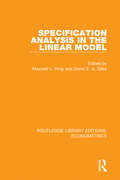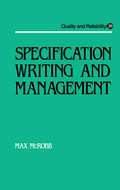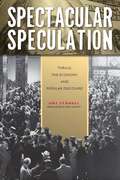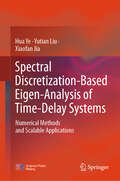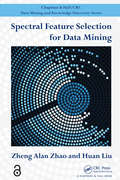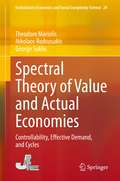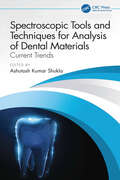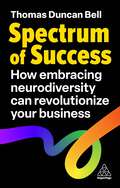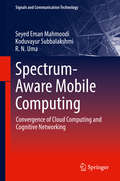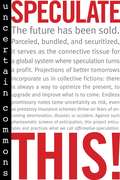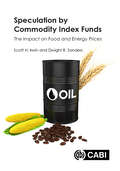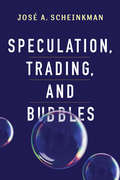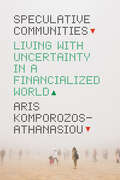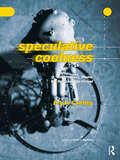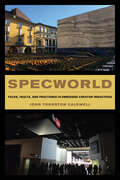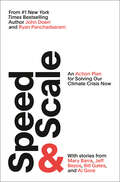- Table View
- List View
Specification Analysis in the Linear Model (Routledge Library Editions: Econometrics #11)
by Maxwell L. King David E. A. GilesOriginally published in 1987. This collection of original papers deals with various issues of specification in the context of the linear statistical model. The volume honours the early econometric work of Donald Cochrane, late Dean of Economics and Politics at Monash University in Australia. The chapters focus on problems associated with autocorrelation of the error term in the linear regression model and include appraisals of early work on this topic by Cochrane and Orcutt. The book includes an extensive survey of autocorrelation tests; some exact finite-sample tests; and some issues in preliminary test estimation. A wide range of other specification issues is discussed, including the implications of random regressors for Bayesian prediction; modelling with joint conditional probability functions; and results from duality theory. There is a major survey chapter dealing with specification tests for non-nested models, and some of the applications discussed by the contributors deal with the British National Accounts and with Australian financial and housing markets.
Specification Writing and Management
by Max McrobbThis book deals with the fundamentals of specification writing and management. It is useful for anyone concerned with the preparation of standards in a world that is shrinking due to improvement in communication and where many specifications have to hold clarity when translated into other languages.
Spectacular Speculation: Thrills, the Economy, and Popular Discourse
by Urs Staheli Eric SavothSpectacular Speculationis a history and sociological analysis of the semantics of speculation from 1870 to 1930, when speculation began to assume enormous importance in popular culture. Informed by the work of Luhmann, Foucault, Simmel and Deleuze, it looks at how speculation was translated into popular knowledge and charts the discursive struggles of making speculation a legitimate economic practice. Noting that the vocabulary available to discuss the concept was not properly economic, the book reveals the underside of putting it into words. Speculation's success depended upon non-economic language and morally questionable thrills: a proximity to the wasteful practice of gambling or other "degenerate" behaviors, the experience of financial markets as seductive, or out of control. American discourses of speculation take center stage, and the book covers an unusual range of material, including stock exchange guidebooks, ticker tape, moral treatises, plays, advertisements, and newspapers.
Specters of the Atlantic: Finance Capital, Slavery, and the Philosophy of History
by Ian BaucomIn September 1781, the captain of the British slave ship Zong ordered 133 slaves thrown overboard, enabling the ship's owners to file an insurance claim for their lost "cargo. " Accounts of this horrific event quickly became a staple of abolitionist discourse on both sides of the Atlantic. Ian Baucom revisits, in unprecedented detail, the Zong atrocity, the ensuing court cases, reactions to the event and trials, and the business and social dealings of the Liverpool merchants who owned the ship. Drawing on the work of an astonishing array of literary and social theorists, including Walter Benjamin, Giovanni Arrighi, Jacques Derrida, and many others, he argues that the tragedy is central not only to the trans-Atlantic slave trade and the political and cultural archives of the black Atlantic but also to the history of modern capital and ethics. To apprehend the Zong tragedy, Baucom suggests, is not to come to terms with an isolated atrocity but to encounter a logic of violence key to the unfolding history of Atlantic modernity. Baucom contends that the massacre and the trials that followed it bring to light an Atlantic cycle of capital accumulation based on speculative finance, an economic cycle that has not yet run its course. The extraordinarily abstract nature of today's finance capital is the late-eighteenth-century system intensified. Yet, as Baucom highlights, since the late 1700s, this rapacious speculative culture has had detractors. He traces the emergence and development of a counter-discourse he calls melancholy realism through abolitionist and human-rights texts, British romantic poetry, Scottish moral philosophy, and the work of late-twentieth-century literary theorists. In revealing how the Zong tragedy resonates within contemporary financial systems and human-rights discourses, Baucom puts forth a deeply compelling, utterly original theory of history: one that insists that an eighteenth-century atrocity is not past but present within the future we now inhabit.
Spectio: A Digital Lighting Company
by Rajiv Lal Sarah McaraSpectio Tech, founded in 2005, developed and implemented intelligent LED lighting solutions for the industrial market. Sensors and wireless connectivity embedded in its LED fixtures not only significantly reduced lighting-related energy use-by up to 90% in some cases-but also served as a tool for the Internet of Things (IoT) to expose powerful insights about facility use. Yet in 2016, few of Spectio's customers were fully embracing the system as an IoT product. Both LED lighting and IoT were rapidly evolving markets, and Spectio had to decide if it should focus on driving down lighting hardware costs to expand its total addressable market or on improving the software controls to enhance the system's IoT functionality.
Spectio: A Digital Lighting Company
by Rajiv Lal Sarah McaraSpectio Tech, founded in 2005, developed and implemented intelligent LED lighting solutions for the industrial market. Sensors and wireless connectivity embedded in its LED fixtures not only significantly reduced lighting-related energy use-by up to 90% in some cases-but also served as a tool for the Internet of Things (IoT) to expose powerful insights about facility use. Yet in 2016, few of Spectio's customers were fully embracing the system as an IoT product. Both LED lighting and IoT were rapidly evolving markets, and Spectio had to decide if it should focus on driving down lighting hardware costs to expand its total addressable market or on improving the software controls to enhance the system's IoT functionality.
Spectral Discretization-Based Eigen-Analysis of Time-Delay Systems: Numerical Methods and Scalable Applications
by Hua Ye Yutian Liu Xiaofan JiaThis book focuses on the partial spectral discretization (PSD)-based eigenvalue computation methods for large-scale time-delay systems. Due to past-dependence in the evolution of a system, time delays may greatly affect the system’s dynamics. For example, wide-area damping controllers in the interconnected power systems are fed by remote synchrophasor measurements and thus inevitably introduce time delays into the control loop. These delays ranging from tens to hundreds of milliseconds can deteriorate the performance of the controllers and further jeopardize the power system stability. Therefore, this book addresses two classes of efficient eigenvalue computation methods for time-delay systems based on the PSD idea, as well as their applications to power systems with inclusion of time delays. The methods are expected to obtain the accurate stability boundary of time-delay systems with affordable computational burden. This book would appeal to engineers, researchers and graduate students in power and control engineering, as well as computational and applied mathematicians.
Spectral Feature Selection for Data Mining (Chapman And Hall/crc Data Mining And Knowledge Discovery Ser.)
by Huan Liu Zheng Alan ZhaoSpectral Feature Selection for Data Mining introduces a novel feature selection technique that establishes a general platform for studying existing feature selection algorithms and developing new algorithms for emerging problems in real-world applications. This technique represents a unified framework for supervised, unsupervised, and semisupervise
Spectral Theory of Value and Actual Economies: Controllability, Effective Demand, and Cycles (Evolutionary Economics and Social Complexity Science #24)
by Theodore Mariolis Nikolaos Rodousakis George SoklisThis book develops a unified treatment of the income distribution–capital–value problems with respect to actual economies, and then gradually turns to the issues of effective demand and capitalist accumulation fluctuations from both political economy and economic policy perspectives. That treatment, on the one hand, places produced means of production, positive profits, and capital accumulation at the centre of the analysis and, on the other hand, is analytically based on the modern control theory. Hence, the authors’ investigation is concerned with input–output representations of actual single and joint production, heterogeneous labour, and open economies; zeroes in on the characteristic value distributions of the system matrices; and, finally, derives meaningful theoretical results consistent with the empirical evidence, and vice versa. The main topics addressed are the uncontrollable/unobservable aspects of the real-world economies, the powerful low-order spectral approximations and reconstructions of the inter-industry structure of production–value–distributive variables relationships, the critical-constructive appraisal of both “mainstream” and “radical” theories of value, the matrix demand multipliers and demand-switching policies in heterogeneous capital worlds, and the circular inter-actions amongst income distribution, effective demand, accumulation, and technical conditions of production. Written on the occasion of the 60th anniversary of the publication of both Piero Sraffa’s Production of Commodities by Means of Commodities and Rudolf E. Kalman’s paper “On the general theory of control systems”, this book provides a consistent and comprehensive framework for theoretical, empirical, and economic policy research.
Spectroscopic Tools and Techniques for Analysis of Dental Materials: Current Trends
by Ashutosh Kumar ShuklaSpectroscopic Tools and Techniques for Analysis of Dental Materials: Current Trends introduces the dental materials and spectroscopic techniques applied for the analysis of such materials, including ceramic, metallic, polymeric and composites. The following individual chapters are primarily based on particular spectroscopic techniques and their applications, including X-ray Spectroscopy, Ultraviolet & visible spectroscopy, Fourier Transfer Infrared Spectroscopy, Raman Spectroscopy and Mass spectrometry. Different oral diseases, caries, calculus, periodontitis and oral mucosal diseases such as oral cancer, will be discussed as well.This is an ideal book for dental professionals, researchers and students interested in the analysis of dental materials.Key Features: Individual chapters include brief introductions of specific techniques Mathematical details are kept at a necessary minimum level Includes case studies to suit the target audience
Spectrum Auctions and Competition in Telecommunications
by Gerhard Illing Ulrich KlühThis book collects essays on this topic by leading analysts of telecommunications and the European auction experience, all but one presented at a November 2001 CESifo conference; comments and responses are included as well, to preserve some of the controversy .
Spectrum Equity Investors, L.P.
by Jeffry A. Timmons Rebecca Voorheis Elise MartinBrion Applegate and Bill Collatos had already started a fund-raising campaign for their new venture-capital fund when the principals of a prestigious Wall Street investment bank asked them to become the two senior partners of an in-house $150 million fund. The case analyzes: (1) the venture capital investing process, (2) the experience, networks, and timing of starting a specialized fund, (3) the written prospectus of the new fund, and (4) the decisions and issues confronting Applegate and Collatos.
Spectrum of Success: How Embracing Neurodiversity Can Revolutionize Your Business
by Thomas Duncan BellUnlock the full potential of neurodiverse people and create a more inclusive, supportive and adaptive business with Spectrum of Success.20% of the global population is neurodivergent, but the world isn't built for them. Their incredible talent becomes wasted when they don't have the opportunity to succeed. Spectrum of Success uncovers how we can create a more accessible work culture that champions neurodiversity and promotes allyship and collaboration.Through fascinating research and inspiring interviews with neurodiverse business leaders, mental health expert Thomas Duncan Bell uncovers how we can support and champion neurodiversity at work and beyond. Drawing upon his own experiences with ADHD and bipolar disorder, the book also offers an enlightening insight into how neurodiverse individuals can thrive in the modern world.
Spectrum-Aware Mobile Computing: Convergence of Cloud Computing and Cognitive Networking (Signals and Communication Technology)
by R. N. Uma Seyed Eman Mahmoodi Koduvayur SubbalakshmiThis book presents solutions to the problems arising in two trends in mobile computing and their intersection: increased mobile traffic driven mainly by sophisticated smart phone applications; and the issue of user demand for lighter phones, which cause more battery power constrained handhelds to offload computations to resource intensive clouds (the second trend exacerbating the bandwidth crunch often experienced over wireless networks). The authors posit a new solution called spectrum aware cognitive mobile computing, which uses dynamic spectrum access and management concepts from wireless networking to offer overall optimized computation offloading and scheduling solutions that achieve optimal trade-offs between the mobile device and wireless resources. They show how in order to allow these competing goals to meet in the middle, and to meet the promise of 5G mobile computing, it is essential to consider mobile offloading holistically, from end to end and use the power of multi-radio access technologies that have been recently developed. Technologies covered in this book have applications to mobile computing, edge computing, fog computing, vehicular communications, mobile healthcare, mobile application developments such as augmented reality, and virtual reality.
Speculate This!
by Uncertain CommonsA short, timely manifesto critiquing predatory modes of financial speculation that seek to minimize uncertainty and risk, while advocating speculative practices that embrace uncertainty, spur radical change, and enable alternative futures.
Speculation by Commodity Index Funds: The Impact on Food and Energy Prices
by Professor Scott H. Irwin Professor Dwight R. SandersCommodity futures prices exploded in 2007-2008 and concerns about a new type of speculative participant in commodity futures markets began to emerge. The main argument was that unprecedented buying pressure from new "commodity index" investors created massive bubbles that resulted in prices substantially exceeding fundamental value. At the time, it was not uncommon to link concerns about speculation and high prices to world hunger, food crises, and civil unrest. Naturally, this outcry resulted in numerous regulatory proposals to restrict speculation in commodity futures markets. At the core, these assertions raised major economic questions about the efficiency of price discovery in commodity futures markets. Moreover, these so-called remedies did not come without a potential cost. Burdensome regulations would increase compliance and risk sharing costs across the global food system, lowering prices for producers and increasing costs to consumers. This book presents important research on the impact of index investment on commodity futures prices that the authors conducted over the last fifteen years. The eleven articles presented in the book follow the timeline of our involvement in the world-wide debate about index funds as it evolved after 2007. We also include an introductory chapter, new author forewords for each article chapter, and a lessons learned chapter to round out the book. Policy-makers, researchers, and market participants will find the book not only functions as useful documentation of the debate; but, also as a natural starting point when high commodity prices inevitably create the next speculation backlash.
Speculation, Trading, and Bubbles
by Joseph E. Stiglitz Patrick Bolton Kenneth J. Arrow Sanford J. Grossman José A. ScheinkmanThe history of financial markets is full of moments in which asset prices inflate far beyond their intrinsic value. These events are commonly called bubbles, and in this book, José A. Scheinkman and other top economists offer new explanations for this phenomenon.Scheinkman discusses some stylized facts concerning bubbles, such as high trading volume and the coincidence between bubbles' implosion and increases in supply, and he develops a model for bubbles based on differences in beliefs among investors that explains these observations. Sandy Grossman and Patrick Bolton offer commentaries on Scheinkman's work, investigating factors that contribute to bubbles, such as excessive leverage, overconfidence, mania, and panic in speculative markets. Kenneth J. Arrow and Joseph E. Stiglitz add introductory material contextualizing Scheinkman's findings.
Speculation, Trading, and Bubbles (Kenneth J. Arrow Lecture Series)
by José A. ScheinkmanAs long as there have been financial markets, there have been bubbles—those moments in which asset prices inflate far beyond their intrinsic value, often with ruinous results. Yet economists are slow to agree on the underlying forces behind these events. In this book José A. Scheinkman offers new insight into the mystery of bubbles. Noting some general characteristics of bubbles—such as the rise in trading volume and the coincidence between increases in supply and bubble implosions—Scheinkman offers a model, based on differences in beliefs among investors, that explains these observations. Other top economists also offer their own thoughts on the issue: Sanford J. Grossman and Patrick Bolton expand on Scheinkman's discussion by looking at factors that contribute to bubbles—such as excessive leverage, overconfidence, mania, and panic in speculative markets—and Kenneth J. Arrow and Joseph E. Stiglitz contextualize Scheinkman's findings.
Speculative Communities: Living with Uncertainty in a Financialized World
by Aris Komporozos-AthanasiouSpeculative Communities investigates the financial world’s influence on the social imagination, unraveling its radical effects on our personal and political lives. In Speculative Communities, Aris Komporozos-Athanasiou examines the ways that speculation has moved beyond financial markets to shape fundamental aspects of our social and political lives. As ordinary people make exceptional decisions, such as the American election of a populist demagogue or the British vote to leave the European Union, they are moving from time-honored and -tested practices of governance, toward the speculative promise of a new, more uncertain future. This book shows how even our methods of building community have shifted to the speculative realm as social media platforms enable and amplify our volatile wagers. For Komporozos-Athanasiou, “to speculate” means increasingly “to connect,” to endorse the unknown pre-emptively, and often daringly, as a means of social survival. Grappling with the question of how more uncertainty can lead to its full-throated embrace rather than dissent, Speculative Communities shows how finance has become the model for society writ large. As Komporozos-Athanasiou argues, virtual marketplaces, new social media, and dating apps bring finance’s opaque infrastructures into the most intimate realms of our lives, leading to a new type of speculative imagination across economy, culture, and society.
Speculative Communities: Living with Uncertainty in a Financialized World
by Aris Komporozos-AthanasiouSpeculative Communities investigates the financial world’s influence on the social imagination, unraveling its radical effects on our personal and political lives. In Speculative Communities, Aris Komporozos-Athanasiou examines the ways that speculation has moved beyond financial markets to shape fundamental aspects of our social and political lives. As ordinary people make exceptional decisions, such as the American election of a populist demagogue or the British vote to leave the European Union, they are moving from time-honored and -tested practices of governance, toward the speculative promise of a new, more uncertain future. This book shows how even our methods of building community have shifted to the speculative realm as social media platforms enable and amplify our volatile wagers. For Komporozos-Athanasiou, “to speculate” means increasingly “to connect,” to endorse the unknown pre-emptively, and often daringly, as a means of social survival. Grappling with the question of how more uncertainty can lead to its full-throated embrace rather than dissent, Speculative Communities shows how finance has become the model for society writ large. As Komporozos-Athanasiou argues, virtual marketplaces, new social media, and dating apps bring finance’s opaque infrastructures into the most intimate realms of our lives, leading to a new type of speculative imagination across economy, culture, and society.
Speculative Communities: Living with Uncertainty in a Financialized World
by Aris Komporozos-AthanasiouSpeculative Communities investigates the financial world’s influence on the social imagination, unraveling its radical effects on our personal and political lives. In Speculative Communities, Aris Komporozos-Athanasiou examines the ways that speculation has moved beyond financial markets to shape fundamental aspects of our social and political lives. As ordinary people make exceptional decisions, such as the American election of a populist demagogue or the British vote to leave the European Union, they are moving from time-honored and -tested practices of governance, toward the speculative promise of a new, more uncertain future. This book shows how even our methods of building community have shifted to the speculative realm as social media platforms enable and amplify our volatile wagers. For Komporozos-Athanasiou, “to speculate” means increasingly “to connect,” to endorse the unknown pre-emptively, and often daringly, as a means of social survival. Grappling with the question of how more uncertainty can lead to its full-throated embrace rather than dissent, Speculative Communities shows how finance has become the model for society writ large. As Komporozos-Athanasiou argues, virtual marketplaces, new social media, and dating apps bring finance’s opaque infrastructures into the most intimate realms of our lives, leading to a new type of speculative imagination across economy, culture, and society.
Speculative Coolness: Architecture, Media, the Real, and the Virtual
by Bryan CantleyCantley’s work offers a unique and critical insight into the emergence of a liminal territory that exists between the real and the virtual that mainstream architecture has yet to exploit. Speculative Coolness surveys and collects a highly experimental architecture/design praxis. This book presents a selected body of his work, showcasing projects which seek to understand and explore the conditions, contexts, and media logics which govern this new territory, and to speculate on the Architecture[s] which it might occupy, and which might occupy it. Featuring both resolved projects and work[s] that are under development, this anthology represents constructs that locate themselves somewhere between architecture and its documentative media. The projects are presented alongside a series of critical essays written by pre-eminent architectural practitioners and theorists. These essays explore the disciplinary, social, and cultural context of the work, serving to underscore the importance of these explorations to the expansion of disciplinary knowledge.
Specworld: Folds, Faults, and Fractures in Embedded Creator Industries
by John Thornton CaldwellJohn Thornton Caldwell’s landmark Specworld demonstrates how twenty-first-century media industries monetize and industrialize creative labor at all levels of production. Through illuminating case studies and rich ethnography of colliding social-media and filmmaking practices, Caldwell takes readers into the world of production workshopping and trade mentoring to show media production as an untidy social construct rather than a unified, stable practice. This messy complex system, he argues, is full of discrete yet interconnected parts that include legacy production companies, marketers and influencers, aspirant online producers, data miners, financiers, talent agencies, and more. Caldwell peels away the layers of these embedded production systems to examine the folds, fault lines, and fractures that underlie a risky, high-pressure, and often exploitative industry. With insights on the ethical and human predicament faced by industry hopefuls and crossover creators seeking professional careers, Caldwell offers new interpretive frames and research methods that allow readers to better see the hidden and multifaceted financial logics and forms of labor embedded in contemporary media production industries.
Speechless: The Erosion of Free Expression in the American Workplace
by Bruce BarryA factory worker is fired because her boss dislikes the political bumper sticker on her car in the parking lot. Another is canned after refusing to display an American flag at his workstation.
Speed & Scale: An Action Plan for Solving Our Climate Crisis Now
by John Doerr#1 bestselling author and acclaimed venture capitalist John Doerr reveals a sweeping action plan to conquer humanity&’s greatest challenge: climate change.In 2006, John Doerr was moved by Al Gore&’s An Inconvenient Truth and a challenge from his teenage daughter: &“Dad, your generation created this problem. You better fix it.&” Since then, Doerr has searched for solutions to this existential problem—as an investor, an advocate, and a philanthropist. Fifteen years later, despite breakthroughs in batteries, electric vehicles, plant-based proteins, and solar and wind power, global warming continues to get worse. Its impact is all around us: droughts, floods, wildfires, the melting of the polar ice caps. Our world is squarely in a climate crisis and on the brink of a climate disaster. Yet despite our state of emergency, climate change has yet to be tackled with the urgency and ambition it demands. More than ever, we need a clear course of action. What if the goal-setting techniques that powered the rise of today's most innovative organizations were brought to bear on humanity's greatest challenge? Fueled by a powerful tool called Objectives and Key Results (OKRs), SPEED & SCALE offers an unprecedented global plan to cut greenhouse gas emissions before it&’s too late. Used by Google, Bono&’s ONE foundation, and thousands of startups the world over, OKRs have scaled ideas into achievements that changed the world. With clear-eyed realism and an engineer&’s precision, Doerr identifies the measurable OKRs we need to reduce emissions across the board and to arrive by 2050 at net zero—the point where we are no longer adding to the heat-trapping carbon in the atmosphere. By turns pragmatic and inspiring, SPEED & SCALE intersperses Doerr&’s wide-ranging analysis with firsthand accounts from Jeff Bezos, Christiana Figueres, Al Gore, Mary Barra, Bill Gates, and other intrepid policy leaders, entrepreneurs, scientists, and activists. A launchpad for those who are ready to act now, this book is geared to leaders in every walk of life. With a definitive action plan, the latest science, and a rising climate movement on our side, we can still reach net zero before it is too late. But as Doerr reminds us, there is no more time to waste.
